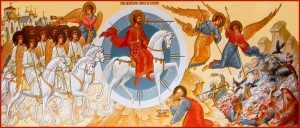30 November OS 2018 – Nativity Fast; Thursday of the 11th Week of St. Luke; Holy Apostle Andrew the First-Called
Today’s daily Gospel reading is Luke 20: 9-18
At that time, Jesus began to speak to the people this parable; A certain man planted a vineyard, and let it forth to husbandmen, and went into a far country for a long time. And at the season he sent a servant to the husbandmen, that they should give him of the fruit of the vineyard: but the husbandmen beat him, and sent him away empty. And again he sent another servant: and they beat him also, and entreated him shamefully, and sent him away empty. And again he sent a third: and they wounded him also, and cast him out. Then said the lord of the vineyard, What shall I do? I will send my beloved son: it may be they will reverence him when they see him. But when the husbandmen saw him, they reasoned among themselves, saying, This is the heir: come, let us kill him, that the inheritance may be ours. So they cast him out of the vineyard, and killed him. What therefore shall the lord of the vineyard do unto them? He shall come and destroy these husbandmen, and shall give the vineyard to others. And when they heard it, they said, God forbid. And he beheld them, and said, What is this then that is written, The stone which the builders rejected, the same is become the head of the corner. Whosoever shall fall upon that stone shall be broken; but on whomsoever it shall fall, it will grind him to powder.
The vineyard in the parable is the Old Testament Church, and the husbandmen (farmers) are the priests, scribes, and other leaders of the Old Testament Church. The servants sent to collect the rent are the prophets, whom the leaders of the Old Israel consistently persecuted and killed, and the son of the master is, of course, Our Lord Himself, whose judicial murder was the crowning achievement, so to speak, the ultimate logical outcome, of Old Israel’s long career of betraying their God. God took the vineyard, the Church, from these people, and He gave it to the Gentiles, or rather, to all, Jew and Gentile alike, who believe in the Lord Jesus Christ, are baptized in the Name of the Holy Trinity, and profess the Orthodox Faith.
This is the theological meaning of the parable. But the parable has also a moral message, a warning for us: the leaders of the New Testament Church, and by extension those who follow them, can also fall away and be cut off from the True Vine, Who is Christ. Is this not what we see going on today, an apostasy of unprecedented scale and rapidity? Supposedly Orthodox hierarchs can publicly teach just about anything – that belonging to Luciferian organizations (the World Council of Churches, etc.) does not constitute apostasy, that the Vatican II Wacko Circus “church” of Pope Francis (“Who am I to judge homosexuals…” “Atheists go to heaven too…” etc.) is our “sister church,” that Mohammed is a true prophet, that Christians, Jews, and Moslems all worship the same God, that the Fourth Ecumenical Council is true for us but not true for the Monophysites (who are not really Monophysites but Orthodox like us only without the 4th through the 7th Councils but that’s OK), and on and on – and after a few scattered voices make a namby-pamby little protest with no teeth in it, most everyone just shuts up and keeps following them. They will not break with these people because they believe these ecclesiastical potentates to be not tenants but owners of the Vineyard, and that nothing they say or do – no matter how outrageous, public, un-repented, and long-enduring, (indeed generational) – can possibly change that. On Judgment Day they will have another think coming.
Meanwhile what are we doing, the True Orthodox who are not following the apostate “husbandmen”? Are we diligently working in God’s vineyard or just hunkering down in personal comfort, tut-tutting the wickedness of others and hoping the bad times will pass? We have bishops and priests. We have the wonderful divine services and above all the Divine Liturgy, Holy Communion, and all the Holy Mysteries. We have our prayer books, to help us say our daily prayers. Here in the “Western” world, we have varied and abundant food, making it easier than ever to keep the fasts, if only we tried a bit. Orthodox literature is more abundant and available than ever, both in print and on the Internet. In short, God has given us our talent, and we have to put it to work. He is without any doubt going to demand it back with interest; we have His word for it.
Try this exercise: At the end of the day, write down what you did that day for God and for the salvation of your soul and other people’s souls. How long will the list be? Think about it.

